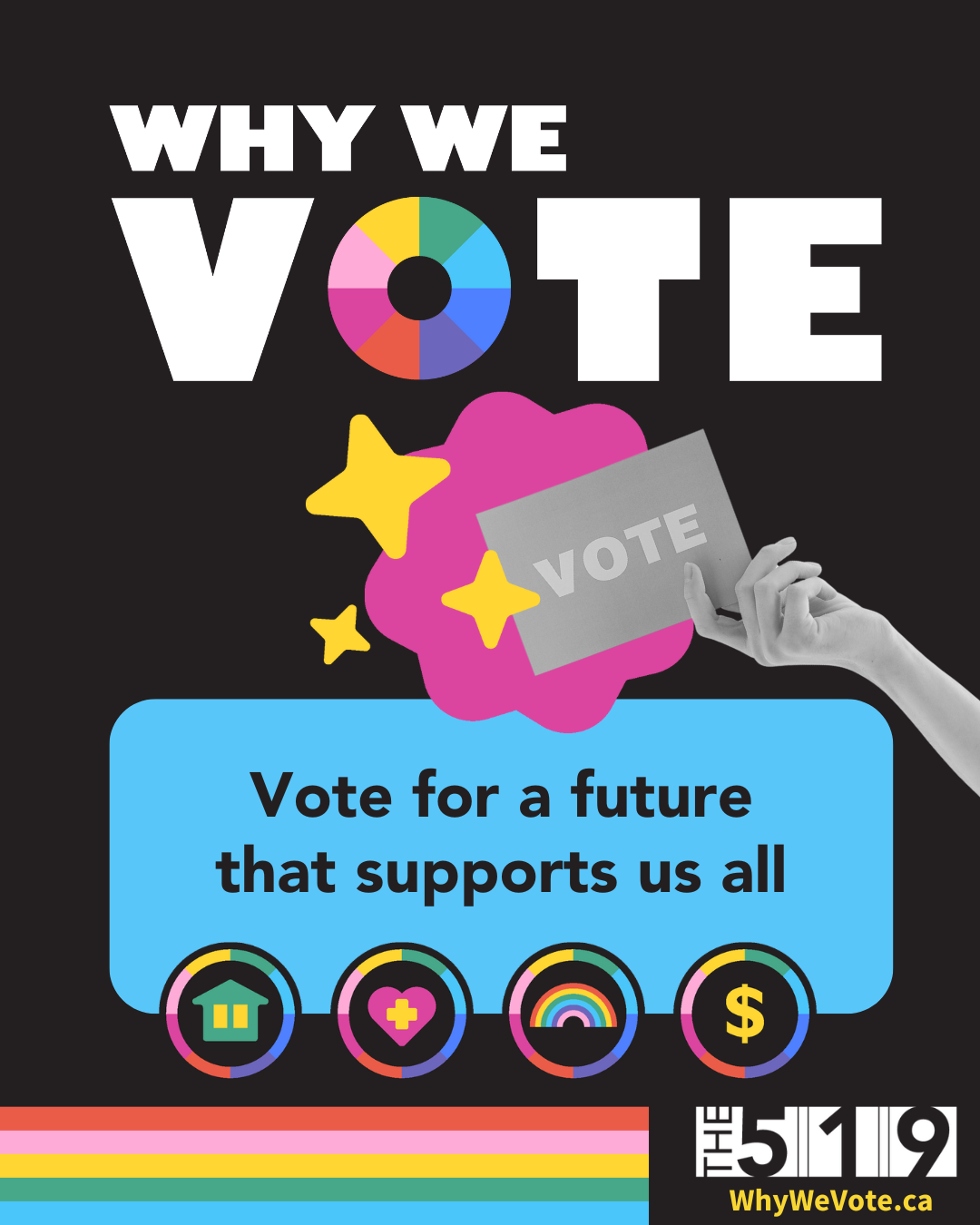Issues
There’s So Much At Stake.
We need to tell our loved ones, our neighbours, and candidates Why We Vote
The Federal Election Day is on Monday, April 28, coming up in
Key Issues For 2SLGBTQ+ Communities During the Federal Election
The skyrocketing cost of living and housing hits our communities especially hard. Getting the healthcare we need—from HIV care to gender-affirming care—feels like an uphill battle because the system wasn’t built with us in mind.
For many 2SLGBTQ+ people — including seniors, refugees, youth, and people living with disabilities — it’s becoming that much tougher to get by during an affordability crisis that’s affecting everyone.
Canada is facing an existential threat from the President of the United States, and 2SLGBTQ+ communities in the US are under sustained attack. The extreme anti 2SLGBTQ+ climate in the USA should have no place in Canadian politics.
A trade war with the US will also throw Canada’s economy into chaos. Threats to Canada’s economy will hurt Canada’s most vulnerable communities first and most deeply.
Every election matters, but at a time when the rights and dignity we’ve fought so hard for are under attack at home and abroad, it’s never been more important to ensure we show up. We matter, so we vote.
This election, The 519 community is sharing Why We Vote, and encouraging you to do the same.


Support 2SLGBTQ+ Human Rights, Safety, and Wellbeing
People in Canada all want the respect and care we deserve. Anti-2SLGBTQ+ hate is on the rise, but we refuse to let it divide us and hamper our continued fight for our human rights, safety, and dignity.
The Issue
There have been policy changes threatening our rights to safety while political leaders at home and abroad deny the existence of our identities. It’s no surprise there there’s growing online hate, with social platforms like Meta changing moderation rules to allow for 2SLGBTQ+ people to be called mentally ill. We’ve seen unprecedented attacks on the human rights of youth in schools. Hate crime numbers are on the rise every year. Across Canada and beyond, we’re seeing an alarming rise in anti-2SLGBTQ+ hate and discrimination.
We’ve fought too hard and for too long for the right to be who we are, and love who we love. This election, we need to send a clear message: Going backwards is not an option.
Protecting our rights, tackling hate and violence, ensuring that discrimination is stopped in its tracks, and strengthening community support for 2SLGBTQ+ people must be at the forefront of the federal election.
Our fight for equity and safety continues. Let’s make sure we don’t lose the progress that Canadians have worked so hard to achieve.
How it Impacts 2SLGBTQ+ Communities
Rising Hate: A Call to Action
In 2023, hate crimes against 2SLGBTQ+ people rose 69%. Since 2016, these attacks have increased by nearly 400%.
According to the most recent report from Statistics Canada, hate crimes motivated by sexual orientation and/or gender identity are far more likely to be violent than other hate crimes. Roughly two-thirds of these crimes are violent in nature, primarily violent assaults.
This alarming rise in hate-motivated violence comes at a time when anti-queer and anti-trans movements are on the march, emboldened in their effort to take away our rights and threaten our peace. This is taking place as elected officials in some provinces have both taken action to limit the rights of 2SLGBTQ+ youth.
Stop Discrimination
2SLGBTQ+ communities continue to face discrimination across all aspects of life – at school, work, as tenants, and on the streets. The Federal government must strengthen anti-discrimination laws and build inclusive policies. Since many people experiencing homelessness are 2SLGBTQ+ due to discrimination and a lack of family support, decriminalizing homelessness and drug use would allow some in our community to go through tough times without the added stress of being policed.
Recently, Saskatchewan premier Scott Moe took an extraordinary step when he pushed through a transphobic policy using something called the notwithstanding clause. This clause allowed him to put a law in place even though it violated human rights. The next government of Canada should confirm that the notwithstanding clause should never be used to step on the Charter rights of 2SLGBTQI+ communities.
Supporting 2SLGBTQ+ Communities
It’s through community that 2SLGBTQ+ people find themselves. It’s through community that we support each other, grow, and become our authentic selves. No matter what policies come from the government, we will always take care of each other.
But there is still so much work to be done. 2SLGBTQ+ seniors are more likely to feel lonely and isolated than their peers. Three in ten 2SLGBTQ+ Canadians report having poor mental health, compared to fewer than one in ten non-2SLGBTQ+ Canadians.
2SLGBTQ+ organizations are facing growing demands for support, despite limited resources. American statistics show that only 0.16% of all charitable giving goes to LGBTQ+ organizations.
What We Need
The Canadian government must support inclusive policies that protect 2SLGBTQ+ communities, support anti-discrimination efforts, ensure safety, and provide funding for anti-hate measures to queer community organizations.
Investing in communities to help them meet their own needs is always a wise decision. Funding programs and organizations that support the wellbeing of 2SLGBTQ+ people will lead to a safer, more vibrant Canada for queer and trans people.
The Canadian government already has a Federal 2SLGBTQI+ Action Plan created in 2022. They simply need to follow through on its recommendations. We’ve made good progress in recent years, such as when conversion therapy was made illegal in 2022, but there is more to do. 2SLGBTQ+ homelessness rates must come down, and we must affirm our commitment to LGBTQ+ refugees, especially as the United States is seeking to criminalize trans and queer people.
Anti-2SLGBTQ+ hate has gotten worse since the Action Plan was created, so the need to follow through on its recommendations is more important than ever. We need a national strategy, with funding, to support anti-violence initiatives, and to regulate social media platforms and algorithms that thrive on and push extremist content, radicalizing average people into far-right extremists in the name of their company bottom lines.
Justice can look many ways. Often the justice system can make things worse, and hurt victims. Some groups of people struggle to trust police because of past and present mistreatment. This can mean if a queer or trans person, of person of colour is the victim of hate motivated violence, they might not even tell police out of fear that the police may mistreat them too. The Canadian federal government needs to fund social services, mental health interventions, and victim supports to ensure people can get the right care in a crisis.
Questions to Candidates
- How will your government ensure that 2SLGBTQ+ communities are protected from discrimination and violence in Canada?
- What steps will you take to fund and support community organizations that provide safety and resources for 2SLGBTQ+ people?
- Will you commit to reducing the administrative barriers for changing name and gender markers on official documents in Canada?
- What actions will you take to ensure that 2SLGBTQ+ communities have a voice in shaping legislative changes that directly impact them?
- What measures will you put in place to tackle hate crimes and online hate targeting 2SLGBTQ+ individuals in Canada?
- How do you plan to create a safer and more welcoming Canada for queer and trans people, especially in rural and underserved communities?
- Do you commit to not use the notwithstanding clause to override the Charter rights of 2SLGBTQI+ communities?

Cost of Living and The Trade War
Everything is too expensive, and Canadians need relief. Companies need to be held accountable, and wages and social assistance must rise. An erratic US President is causing economic hardship on Americans and Canadians with a nonsensical trade war.
The Issue
The cost of living crisis is causing significant financial strain for most Canadians. Many households are struggling to afford basic necessities like groceries and utilities.
With the potential devastating effects of a trade war with the United States looming, ensuring that people are supported through these difficult times is more important than ever.
Job precarity is on the rise, with many workers facing unstable, low-wage employment and limited benefits. Despite the hard work of those earning minimum wage, it’s still not enough to make ends meet, leaving too many people one unexpected cost away from a financial crisis.
How it Impacts 2SLGBTQ+ Communities
2SLGBTQ+ people are more likely to have lower incomes, and may rely on social assistance. Even 2SLGBTQ+ people who aren’t living on low-incomes are still feeling the effects of the cost of living crisis. Skyrocketing housing costs mean that 2SLGBTQ+ people with stable, well-paying jobs still can’t buy a house like their parents could, despite doing everything they were told would make that possible for them.
Like all communities, the cost of living crisis affects the sense of security and stability of 2SLGTQ+ people. For queer and trans people, issues like increased financial strain are made worse by a lack of employment opportunities, discrimination, and wage gaps faced by the community. These financial pressures can lead to stressful situations where people are choosing between things like rent and medication.
At The 519, we’ve seen how the cost of groceries creates a real burden for our community members, with hundreds of thousands of meals distributed through our meal program over the past year. We also see how social events and gatherings – crucial for our mental health and wellbeing – are often the first things to go when times are tight.
The President of the United States has also created economic uncertainty by imposing tariffs that are raising the cost of living for Canadians and Americans. Tariffs upset supply chains, driving up the cost of everyday items. Tariffs on steel and lumber drive up the price of housing. 2SLGBTQ+ communities and all Canadians must have access to affordable lives, and stable jobs.
What We Need
As we enter a time of unprecedented economic insecurity, loosening eligibility rules for Employment Insurance and expanding benefits for Employment Insurance, the Canadian Pension Plan, and Old Age Security will go a small way in giving some peace of mind to Canadians who will be impacted.
Concrete plans should be put forward for targeted economic relief programs, such as direct financial assistance or subsidies,, with specific consideration for 2SLGBTQ+ individuals who are more likely to be in precarious financial situations.
At the same time the trade war looms, we have seen a growing movement to abandon workplace equity programs. The next government should commit to policies that ensure equitable hiring practices and that protect against discrimination in employment.
To help support vulnerable communities through this time, the next government should Increase funding for 2SLGBTQ+ community organizations that provide essential services, including mental health support, food programs, and other forms of support.
Questions to Candidates
- What concrete steps will your party take to address the cost of living crisis and ensure that essential goods like groceries and utilities remain affordable for all Canadians?
- How will you ensure that wage increases and social assistance programs keep pace with rising costs, especially for marginalized communities like 2SLGBTQ+ people who are disproportionately affected?
- What measures will your party implement to protect Canadian workers from job precarity and ensure that employment benefits, such as Employment Insurance, remain accessible during economic downturns and trade disruptions?
- How will you address the financial insecurity faced by 2SLGBTQ+ individuals, including systemic employment discrimination and wage gaps, to promote equitable economic opportunities?
- In the event of a trade war with the United States, what specific policies will your party put in place to shield vulnerable communities, including 2SLGBTQ+ people, from the economic fallout?

Housing and Homelessness
We all deserve to have a safe and stable place to call home, but Canadians across all income levels are struggling to afford housing. We need to protect renters, empower average house hunters, and get shovels in the ground.
The Issue
Rents are too high. For many people, even those with stable, well-paying jobs, the dream of owning a home feels out of reach.
Canada’s housing market is one of the most unaffordable in the world. Since 2018, the average rent for a two-bedroom home has increased 70 per cent faster than average wages. And buying a home in Toronto will cost 13.2 times the average income. Government programs aimed at addressing the housing crisis are relying on the kindness of private developers to help solve the problem, and it’s not working.
These soaring housing costs are creating widespread challenges and hardship across the country. By 2027, over 900,000 people across Canada are predicted to be in dire housing need. And given the housing crunch, it shouldn’t be a surprise that homelessness has surged in recent years. In Toronto, 7,958 people were actively homeless in January of 2018. Today, that figure has climbed to 11,114.
How it Impacts 2SLGBTQ+ Communities
2SLGBTQ+ youth are more likely to be homeless due to family rejection and discrimination. In Toronto, 25 to 40% of youth experiencing homelessness identify as 2SLGBTQ+.
Trans, non-binary, and gender-diverse community members face unique challenges in securing stable housing. The Trans Pulse Canada study revealed that 25% of the people in their study had significant difficulty meeting monthly housing costs. Furthermore, 10% said they lost housing based on their identity, a figure that rises to 20% for Indigenous participants. 43% reported discrimination from landlords based on their gender. Gender-diverse people who had experienced homelessness were much more likely to have slept in a public place than cisgender women.
For many 2SLGBTQ+ people, continued family rejection means they cannot rely on family support during difficult times. The “bank of mom and dad,” which many rely on to buy their first home is closed.
2SLGBTQ+ seniors are also particularly vulnerable, as they are much more likely to live alone and without children. For them, a renoviction or a sudden rent increase can be financially devastating.
What We Need
Invest in Social Housing
Federal investment in social housing is a vital and sustainable long-term solution to the housing crisis. Social housing is the responsibility of government and building it cannot be left to private developers. Today’s housing crisis is the result of a lack of investment in social housing over the past 30 years, dating back to the early-1990s. The next government should commit to making the level of investment needed, and build at least 50,000 new rent-geared-to-income social housing units each year for the next 10 years- homes that will be a permanent part of the solution to the housing crisis.
Preserve Existing Affordable Housing
It is much faster and cheaper to save affordable housing that already exists, rather than build new housing and make it ‘affordable’. Currently, Canada is losing 11 affordable housing units for every new one built. More must be done to save Canada’s existing affordable housing stock and prevent those units from being redeveloped into condos or luxury rental units. Nonprofits and co-ops are in the best position to support government-funded housing affordability. The next government needs to quickly implement the new Canadian Rental Protection Fund (based on the BC pilot) , which will allow partners in the nonprofit housing sector to acquire and preserve affordable rental housing for decades to come.
Supporting 2SLGBTQ+ People Experiencing Homelessness Fund 2SLGBTQIA-Centred Shelters and Housing Supports
While Housing and Homelessness is named as a key pillar of action in the Federal 2SLGBTQIA+ Action Plan, little action has been initiated to date. Similarly, while the National Housing Strategy (NHS) identifies 2SLGBTQIA+ as a priority population, only 148 units have been committed for 2SLGBTQIA+ people after 7 years of NHS’ 10-year plan- the lowest of any priority group[1]. The disconnect between these 2 national strategies paints a stark picture of inaction on 2SLGBTQIA+ housing priorities.
Transphobia is commonly experienced in the shelter system, and all along a trans person’s housing journey. More funding must be provided to create affirming shelters, supportive housing and transitional housing that is for and by 2SLGBTQIA+ communities– where queer and trans people experiencing homelessness can feel safe amongst QTBIPOC shelter staff and housing workers who understand them and advocate for them; and feel connected to fellow queer and trans peers who share their experience and become part of their circle of support. These vital supports will help transition queer, trans and gender diverse people out of homelessness to permanent and stable housing.
[1]Progress on the National Housing Strategy, September 2024, page 32.
A Real Definition of Affordable Housing Build Housing that is actually Affordable (and not just for a hot minute)
When governments and developers boast about building ‘affordable housing’, they define affordable as 80% of Average Market Rent (AMR), (or $1,165 for a bachelor apartment)— which is not affordable at all!
What’s more, current ‘affordable housing’ incentive programs only mandate affordability for a short period of time and for a small number of units (eg. 5% of the entire development), with no rent control measures. This means that for-profit developers sometimes get rewarded with tax breaks and incentives for building lots of ‘affordable’ housing, without actually offering real long-term affordability.
The next federal government should invest in affordable housing in a real and transparent way, where ‘affordable housing’ is consistent with the actual cost-of-living, and housing development programs lead to permanent, rent-controlled affordability for at least 50% of the units in the development.
Mandate a Right to Housing framework across all levels of government
Over the last many years, international pressure to ensure a Right to Housing for everyone has led to the creation of a Federal Housing Advocate. Their job is to monitor the federal government’s housing programs and activities, and ensure they support a human right to housing. In short, the Housing Advocate works to protect every person’s right to safe and affordable housing in Canada.
This is great news, but it doesn’t go far enough. If one level of government protects our right to housing, but another level of government decides to protect the interests of corporate landlords and middle-income homeowners, there can be no progress made on our current housing crisis. The next federal government should ensure that all levels of government (federal, provincial and municipal) demonstrate how their policies work towards safeguarding our Right to Housing, so that no one is left behind.
Questions to Candidates
- What specific steps will you take to make housing more affordable for renters and homeowners in Canada?
- Canada is losing affordable housing stock at an alarming rate. How will your government support the preservation of affordable housing units (including non-profit and cooperative housing) to meet the needs of all communities?
- What will you do to support homeless individuals and families, especially those who are marginalized, such as 2SLGBTQ+ youth, Indigenous communities, and racialized groups?
- What measures will you put in place to ensure that new housing developments are not just profit-driven but also serve the public good and address community needs?
- What is your plan to combat discrimination and exclusion in the housing market, especially for 2SLGBTQ+ people?
- Will you commit to a definition of affordable housing that is actually affordable for low-income people?
- How do your incentives for housing developers create long-term, sustainable housing that is affordable to low-income renters?

Healthcare
Everyone has a right to accessible, affirming, and timely healthcare. We need to improve access to primary care for everyone, and address the disproportionate barriers for 2SLGBTQ+ communities.
How it Impacts 2SLGBTQ+ Communities
2SLGBTQ+ people face built-in obstacles that make it harder to access the healthcare they need. These challenges are only made worse by an underfunded and overwhelmed healthcare system.
For people living with HIV/AIDS, patchwork drug coverage leaves many continuing to have to pay out of pocket for their medication. The same goes for people wanting to access PrEP.
While most gender-affirming surgeries are covered by provincial insurance, a shortage of qualified surgeons and clinics leads to long wait times and forces many trans people to travel — sometimes to other provinces or countries — to receive essential care. Trans Canadians deserve better, and increased investment in trans-affirming healthcare is urgently needed.
What We Need
The federal government needs to increase funding to 2SLGBTQ+ health issues and to account for inequalities people in Canada face based on their social determinants of health.
Further, Canada’s HIV/AIDS sector is in dire need of funding. Coverage for easy-to-access HIV prevention and care keeps Canadians safe and healthy. These organizations also do important education, research, and outreach work to help 2SLGBTQ+ people and others who might be at risk understand their health needs.
Healthcare providers also need more training to be inclusive to our communities. City centres like Toronto also need more family doctors, so urban communities, including 2SLGBTQ+ people, can get reliable care.
Questions to Candidates
- What will you do to eradicate barriers that prevent 2SLGBTQ+ Canadians from accessing the health care they need, when they need it?
- What does your party propose for funding 2SLGBTQ+ health issues and for social determinants of health?

Mental Health, Substance Use, and Harm Reduction
We all deserve support when we need it – especially when we need it the most. We’re living through a drug poisoning and mental health crisis. Communities need to be supported, not penalized.
The Issue
Our city is experiencing a drug poisoning and overdose crisis. In 2023, there were 2,647 deaths related to opioids in 2023. In 2014, there were 676. Without critical harm reduction services, more lives will be lost.
People who want help from institutions like rehab centres also languish on wait lists for too long. For Canadians to have true self-determination concerning their substance use, treatment options need to exist across the spectrum, from harm reduction, to accessible help getting sober — if that’s their choice.
How it Impacts 2SLGBTQ+ Communities
2SLGBTQ+ communities are more likely to experience discrimination, hate and violence, and may have less access to support systems at home, at school, or in the workplace. This systemic exclusion and marginalization contribute to significantly higher rates of mental illness and substance use.
The statistics back this up: Nearly one third of 2SLGBTQ+ Canadians say they have poor mental health. 40% of trans people have attempted suicide – a devastating statistic that highlights the urgent need for better mental health support. 2 Spirit, queer, and trans people also experience higher rates of substance use.
Addressing these disparities requires urgent investment in accessible, inclusive mental health and harm reduction services to ensure 2SLGBTQ+ individuals receive the support they need to thrive.
What We Need
First, we need a shift in our culture that rewards the bullying of marginalized people. 2SLGBTQ+ people aren’t naturally predisposed to mental health issues or substance use — we’re more likely to have issues with these things because we’re often abused by people with prejudice against us.
While ending hatred is the first step toward improving our mental health conditions, tThe Canadian government must also work with provinces and territories to expand mental health supports and harm reduction services. People’s lives don’t stop mattering just because they use drugs or experience a mental health crisis.
We need policies that invest in holistic recovery and support programs—ones that recognize harm reduction as a crucial part of a comprehensive system to help those struggling with addiction.
It’s time to treat mental health with the same urgency as physical health. This means real investment in community-based mental health supports, including crisis workers to provide immediate intervention, Low-barrier therapy to ensure affordability and accessibility, and community-specific mental health workers who understand the unique challenges faced by marginalized groups.
Federal support to expand these services will help build a more compassionate and effective system that supports all Canadians in times of crisis.
Questions to Candidates
- Will you commit to increasing long-term funding for community-based mental health supports, including crisis workers and low-barrier therapy?
- How will you ensure mental health services are culturally competent and accessible to 2SLGBTQ+, Indigenous, and other marginalized communities?
- Will you support expanding harm reduction services to prevent further loss of life?
- How will your government invest in harm reduction as part of a broader strategy that includes addiction treatment, housing, and mental health support
- How will you facilitate a shift toward a culture that is kinder to 2SLGBTQ+ people?

Refugee Support
LGBTQ+ refugees have so much to offer Canada. We need to make good on our commitments and help them thrive.
The Issue
The path to Canada is often marked by uncertainty and exploitation for refugees, and even more challenges arise once they arrive. Many refugees begin their journey in Canada by staying in shelters, on the streets, or couch-surfing, struggling to access the support they need to navigate the complex and lengthy settlement process.
People seeking refuge in Canada contribute so much to our communities. Supporting newcomers and refugees is critical to our future and prosperity, but refugees in Canada often lack the crucial social and financial support needed to truly call our country home.
As attacks against queer and trans people intensify in the United States, and international aid fighting anti-LGBT oppression is cut by the US government, many more LGBTQ+ people in oppressive situations around the world may also seek refuge in Canada instead. We may not be able to count on the USA to approve queer and trans refugees at all. Canada must honour our commitments to the safety of LGBTQ+ people everywhere.
How it Impacts 2SLGBTQ+ Communities
LGBTQ+ people are criminalized in 64 countries. That means they can be charged, go to jail, and in some cases even be executed for their sexuality or gender identity. In many more countries, LGBTQ+ individuals endure such extreme hostility that living openly and with pride is impossible.
Once LGBTQ+ refugees arrive in Canada, they often encounter significant challenges, particularly in securing healthcare and housing. In addition, they may not be able to turn to their own cultural communities for support, as these communities may not be accepting of their sexuality or gender identity. Moreover, some may experience a lack of understanding or empathy from immigration lawyers or the refugee board, further complicating their settlement process.
Canada has long been a leader in providing safety and refuge for LGBTQ+ individuals, and this support must continue. Our country is enriched by the cultural diversity and the contributions of individuals who are given the opportunity to thrive. Providing safe and welcoming spaces for LGBTQ+ refugees is an investment in a stronger, more inclusive country.
What We Need
Funding for Settlement Services
The federal government significantly cut funding to IRCC and there is a significant gap in funding doing settlement work and supporting newcomers in Canada.
Organizations like The 519 help refugees through the settlement process and with legal challenges. We also have programs that give refugees opportunities to make friends, learn important integration skills, and gain Canadian experience. However, many of these organizations face long waiting lists for their services due to limited funding.
Questions to Candidates
- What does your party propose for improving protections and settlement services for LGBTQ+ refugees?
- Do you commit to helping LGBTQ+ refugees regardless of rising anti-LGBTQ+ and anti-immigrant sentiment?
- How will your government better educate officials in the refugee settlement process about the needs of LGBTQ+ refugees in Canada?
- Will you commit to defying the rise in anti-2SLGBTQ+ sentiment so LGBTQ+ refugees who have come to Canada for safety can truly live somewhere without legislative hate?

Climate Action
Over the coming decades, the impact of the climate crisis will become increasingly present.
The Issue
Canada is facing hotter, wetter, more hazardous weather due to the climate emergency. Extreme weather, wildfire smoke, and evolving diseases are increasingly changing our lives and affecting our health – the only question is how much?
How it Impacts 2SLGBTQ+ Communities
Severe weather events expose inequality. A huge amount of people experiencing homelessness are 2SLGBTQ+ due to family rejection and discrimination. A lack of shelter immediately puts someone at a much higher level of risk in extreme weather. 2SLGBTQ+ people are more likely to be lower income, and people with lower incomes are more likely to live in housing that is vulnerable to extreme weather, and to be less prepared for natural disasters.
In weather emergencies, people in queer and trans communities may find it more difficult to access healthcare some community members need like HIV or transition care. Climate change will cause people to move, which will change communities in Toronto. How will 2SLGBTQ+ communities thrive culturally and avoid the political scapegoating that often comes in times of stress?
What We Need
The difficulties presented by the environmental crisis touch on many of the other issues in this election. Lower grocery prices and housing costs would mean more people could stockpile resources for a disaster. Mental health, harm reduction, and refugee support means more housed community members. Housing for people experiencing homelessness, and better quality housing for all protects residents from the elements.
Canada needs better emergency planning policies. Infrastructure updates would make power or communications outages during extreme weather less likely, so people can regulate indoor temperatures and receive public warnings. Nonprofit funding can be used for public warming and cooling centres, and emergency planning can reduce the likelihood of flooding.
Of course, we also need a federal government who will prioritize a transition to clean energy and reduced pollution to ease the problem of global warming in the first place. A transition to clean energy would create jobs and lower energy costs to both make and save Canadians money. Renewable energy is also much less vulnerable to foreign tariffs than gasoline or coal.
Questions to Candidates
- What is your party proposing to address the climate crisis?
- What measures will your government implement to strengthen infrastructure and emergency response systems to protect vulnerable populations during extreme weather events, power outages, and natural disasters?
- How will your party support community organizations that provide vital services, such as public warming/cooling centers, mental health support, and harm reduction programs, during climate-related crises?
- What policies will you put in place to ensure that the economic benefits of clean energy job creation are accessible to 2SLGBTQ+ workers and other marginalized communities?
